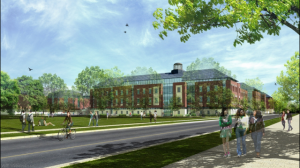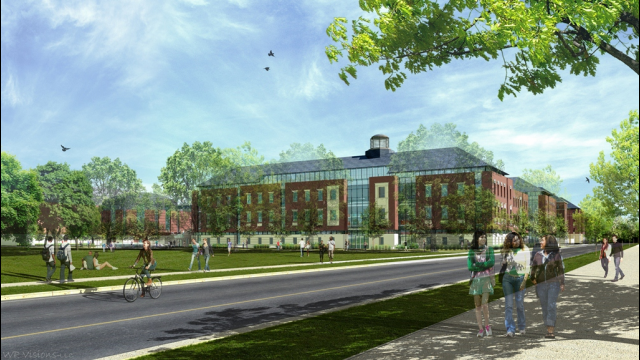
City Editor
The Baylor Board of Regents approved construction on the new business school and track and field facility, designs for North Russell Hall renovations and plans for new doctoral programs at its annual Homecoming meeting Friday.
The board approved construction of the $99 million Paul L. Foster Campus for Business and Innovation. Construction will begin on the 275,000-square-foot facility in December.
Richard Willis, chair of the Board of Regents said the board approved funding for the new business school building in May. Since then, he said enough funds have been raised to make the project viable and move forward with construction.
The largest donation for the building was $35 million from Paul Foster, 1979 Baylor alumnus and the chairman of the board and executive chairman of Western Refining Inc.
“We want to make sure that all of our students, whatever their majors are, will have the best in technology and the best in instruction,” Willis said. “It’s been a while since we’ve had anything new with the business school.”
Willis said the building, scheduled to open in July 2015, will house the Hankamer School of Business. It will be built across from East Village Residential Community in Bagby Avenue, between Third and Fourth streets, according to a Baylor Media Communications press release.
In addition, the board approved implementation of phase two of the $18.1 million on-campus track and field stadium.
Willis said Baylor is fortunate to have gold-medal winners for track and field in the past.
“It’s been hard for students to be able to enjoy the track and field events because it’s just been so far away,” Willis said.
The facility is scheduled to be completed in fall 2014. This phase will add a 10,300-square-foot team building that will include hydrotherapy pools, a training room, offices and meeting rooms, storage space and improved landscaping, the press release states. As the Lariat previously reported, phase one of the project, which would cost $13.6 million and included a 6,000-square-foot team facility and 13,500-square-foot indoor practice facility, was approved in May.
The board also approved $1.1 million to begin designing and engineering work to refurbish North Russell Residence Hall. This work will begin in summer 2014. Willis said funds for the project are part of the operating costs of the university.
Willis also said the addition of East Village Residential Community gave Baylor the capacity to renovate other dormitories on campus.
“It allows us to take one dormitory down every year to renovate it,” Willis said. Willis said dormitories are different today than they were 20 years ago.
“We are spending the extra time and money to be sure they are up to date,” he said. Because the dormitories are being redesigned and updated, Willis said there will be 10 to 15 percent less rooms in the dorms. He said there will be more spaces for students to meet.
Currently, South Russell Residence Hall is being renovated and is scheduled for completion in fall 2014. The changes being made to South Russell will result in both males and females residing in the hall starting in the fall of 2015. In the fall of 2014, it will only house females.
The two new doctoral programs will be a Ph.D. in higher education studies and leadership and a research-oriented Ph.D. in mechanical engineering, according to the press release. Both programs are expected to begin in fall 2014.
Willis said the board does not generate these new programs.
“The faculty, deans and the provost decide what curriculum is important,” he said. “It takes many years, four to five years, to put a program together for approval.”
In the press release, Jon Engelhardt, dean of the School of Education, said Baylor has the opportunity to offer and develop Ph.D. programs that are more holistic.
“Rather than producing Ph.D. graduates with narrow technical expertise, we envision educating graduates with a broad background that will provide the profession with individuals equipped to study and think about higher education in light of a broader potential for human flourishing,” Engelhardt said.





